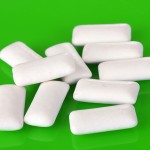
Chewing gum is a activity enjoyed my consumers (particularly teenagers) around the world and is a now multi-billion dollar industry. Historically gums were flavoured with sugar but increasingly sugar substitutes are used, the most common of these being the polyols, sorbitol and xylitol. Chewing stimulates salivary flow and using gum has been recommended when it is difficult to perform proper oral hygiene. The aim of this review was to determine whether chewing sugar-free gum had an effect on plaque indices and parameters of gingival inflammation.
What did they do
The MEDLINE-PubMed, Cochrane-CENTRAL and EMBASE databases and reference lists of included papers were searched for randomized controlled clinical trials (RCTs) or controlled clinical trials (CCTs). Only English language studies in patients 18 years or older comparing sugar-free chewing gum to no gum were considered. The main outcomes considered were plaque and gingivitis scores. Papers were screened and quality assessed and data abstracted independently and in duplicate. Meta-analysis were conducted where appropriate.
What did they find
10 studies were included (six non-brushing and four brushing studies). There was considerable heterogeneity in the studies. Nine studies were performed using a cross-over design with wash-out periods varying from 2 to 9 days. Nine studies mentioned funding, support or supplying of products.
- In the non-brushing studies, the use of chewing gum did not significantly affect the parameters of interest.
- In the descriptive analysis of the brushing studies, four of five comparisons showed a statistically significant effect in favour of the sugar-free chewing gum with respect to plaque scores.
- The metaanalysis for the Quigley & Hein plaque index scores in the brushing studies also showed a significant difference (difference in means -0.24, 95% CI [-0.41; -0.08] P = 0.004).
- For bleeding tendency, the descriptive analysis showed that one of the two comparisons identified a significant difference in favour of chewing gum. The meta-analysis, however, did not substantiate this difference.
The authors concluded
Within the limitations of this systematic review, it may be concluded that the use of sugar-free chewing gum as an adjunct to toothbrushing provides a small but significant reduction in plaque scores. Chewing sugar-free gum showed no significant effect on gingivitis scores. In the absence of brushing, no effect on plaque and gingivitis scores could be established.
Comment
As the authors of the review note there is significant degree of heterogeneity in the studies that they have included in the review, they have also restricted the review to English language studies. The included studies are all relatively small and with the exception of two studies which were of three months duration the remainder all lasted less than one week. With the exception of one study all received some measure of support from manufacturers. In addition, while a significant difference was found in the bushing studies this was small. In view of this perhaps the view expressed by the authors on the directions for further research is the more important take home message;
Based on observations in various chewing gum studies that are performed over many years, the suspicion is there that sugar free chewing gum may provide beneficial effects with respect to both plaque and gingivitis scores . However this systematic review indicates that properly designed studies with adequate numbers of subjects are definitely needed to demonstrate these effects.
Links
Keukenmeester R, Slot D, Putt M, Van der Weijden G. The effect of sugar-free chewing gum on plaque and clinical parameters of gingival inflammation: a systematic review. Int J Dent Hyg. 2012 Jun 30. doi:10.1111/j.1601-5037.2012.00562.x. [Epub ahead of print] PubMed PMID: 22747775.
